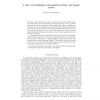Free Online Productivity Tools
i2Speak
i2Symbol
i2OCR
iTex2Img
iWeb2Print
iWeb2Shot
i2Type
iPdf2Split
iPdf2Merge
i2Bopomofo
i2Arabic
i2Style
i2Image
i2PDF
iLatex2Rtf
Sci2ools
113
click to vote
SLOGICA
2008
2008
A Way to Interpret Lukasiewicz Logic and Basic Logic
Fuzzy logics are in most cases based on an ad-hoc decision about the interpretation of the conjunction. If they are useful or not can typically be found out only by testing them with example data. Why we should use a specific fuzzy logic can in general not be made plausible. Since the difficulties arise from the use of additional, unmotivated structure with which the set of truth values is endowed, the only way to base fuzzy logics on firm ground is the development of alternative semantics to all of whose components we can associate a meaning. In this paper, we present one possible approach to justify ex post Lukasiewicz Logic as well as Basic Logic. The notion of ambiguity is central. Our framework consists of a Boolean or a Heyting algebra, respectively, endowed with an equivalence relation expressing ambiguity. The quotient set bears naturally the structure of an MV- or a BL-algebra, respectively, and thus can be used to interpret propositions of the mentioned logics.
Related Content
| Added | 15 Dec 2010 |
| Updated | 15 Dec 2010 |
| Type | Journal |
| Year | 2008 |
| Where | SLOGICA |
| Authors | Thomas Vetterlein |
Comments (0)

